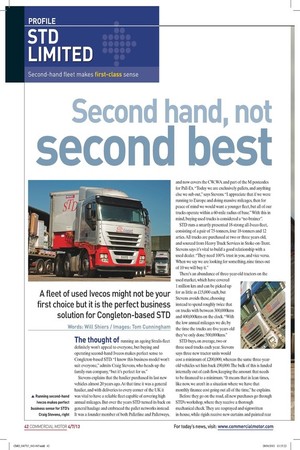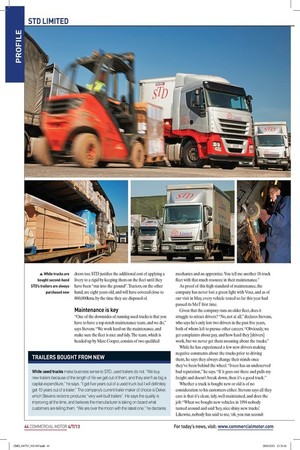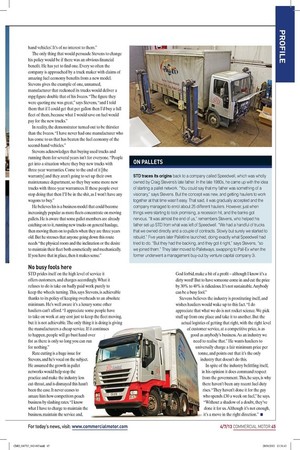PROFILE STD LIMITED Second-hand fleet makes first-class sense St Lond
Page 35

Page 37

Page 38

If you've noticed an error in this article please click here to report it so we can fix it.
hand, not second best A fleet of used lvecos might not be your first choice but it is the perfect business solution for Congleton-based STD Words: Will Shiers / Images: Tom Cunningham The thought of running an ageing Stralis fleet definitely won't appeal to everyone, but buying and operating second-hand Ivecos makes perfect sense to Congleton-based STD. "I know this business model won't suit everyone," admits Craig Stevens, who heads up the family-run company, "but it's perfect for us."
Stevens explains that the haulier purchased its last new vehicles almost 20 years ago. At that time it was a general haulier, and with deliveries to every corner of the UK it A Running second-hand was vital to have a reliable fleet capable of covering high lvecos makes perfect annual mileages. But over the years STD turned its back on business sense for STD's general haulage and embraced the pallet networks instead. Craig Stevens, right It was a founder member of both Palletline and Palletways, and now covers the CVV,WA and part of the M postcodes for Pall-Ex. "Today we are exclusively pallets, and anything else we sub out," says Stevens. "I appreciate that if we were running to Europe and doing massive mileages, then for peace of mind we would want a younger fleet, but all of our trucks operate within a 60-mile radius of base." With this in mind, buying used trucks is considered a "no-brainer': STD runs a smartly presented 18-strong all-Iveco fleet, consisting of a pair of 7.5-tonners, four 18-tonners and 12 artics. All trucks are purchased at two or three years old, and sourced from Heavy Truck Services in Stoke-on-Trent. Stevens says it's vital to build a good relationship with a used dealer. "They need 100% trust in you, and vice versa. When we say we are looking for something, nine times out of 10 we will buy it."
There's an abundance of three-year-old tractors on the used market, which have covered 1 million km and can be picked up for as little as £15,000 each, but Stevens avoids these, choosing instead to spend roughly twice that on trucks with between 300,000kms and 400,000kms on the clock. "With the low annual mileages we do, by the time the trucks are five years old they've only done 500,0001(ms " STD buys, on average, two or three used trucks each year. Stevens says three new tractor units would cost a minimum of £200,000, whereas the same three-yearold vehicles set him back £90,000. The bulk of this is funded internally out of cash flow, keeping the amount that needs to be financed to a minimum. "It means that in lean times, like now, we aren't in a situation where we have that monthly finance cost going out all of the time," he explains.
Before they go on the road, all new purchases go through STD's workshop, where they receive a thorough mechanical check. They are resprayed and signwritten in-house, while rigids receive new curtains and painted rear A While trucks are doors too. STD justifies the additional cost of applying a bought second-hand livery to a rigid by keeping them on the fleet until they STD's trailers are always have been "run into the ground". Tractors, on the other purchased new hand, are eight years old, and will have covered close to 800,000kms, by the time they are disposed of.
Maintenance is key "One of the downsides of running used trucks is that you have to have a top-notch maintenance team, and we do," says Stevens. "We work hard on the maintenance, and make sure the fleet is nice and tidy. The team, which is headed up by Marc Cooper, consists of two qualified mechanics and an apprentice. You tell me another 18-truck fleet with that much resource in their maintenance."
As proof of this high standard of maintenance, the company has never lost a green light with Vosa, and as of our visit in May, every vehicle tested so far this year had passed its MoT first time.
Given that the company runs an older fleet, does it struggle to attract drivers? "No, not at all," declares Stevens, who says he's only lost two drivers in the past five years, both of whom left to pursue other careers. "Obviously, we get complaints about pay, and how hard they [drivers] work, but we never get them moaning about the trucks."
While he has experienced a few new drivers making negative comments about the trucks prior to driving them, he says they always change their minds once they've been behind the wheel. "Iveco has an undeserved bad reputation," he says. "If it goes out there and pulls my freight and doesn't break down, then it's a good truck."
Whether a truck is bought new or old is of no consideration to his customers either. Stevens says all they care is that it's clean, tidy, well-maintained, and does the job. "When we bought new vehicles in 1994 nobody turned around and said `hey, nice shiny new trucks: Likewise, nobody has said to me, 'oh, you run second hand vehicles: It's of no interest to them."
The only thing that would persuade Stevens to change his policy would be if there was an obvious financial benefit. He has yet to find one. Every so often the company is approached by a truck maker with claims of amazing fuel economy benefits from a new model. Stevens gives the example of one, unnamed, manufacturer that reckoned its trucks would deliver a mpg figure double that of his Ivecos. "The figure they were quoting me was great," says Stevens, "and I told them that if I could get that per gallon then I'd buy a full fleet of them, because what I would save on fuel would pay for the new trucks."
In reality, the demonstrator turned out to be thirstier than the Ivecos. "I have never had one manufacturer who has come to us that has beaten the fuel economy of the second-hand vehicles."
Stevens acknowledges that buying used trucks and running them for several years isn't for everyone. "People get into a situation where they buy new trucks with three-year warranties. Come to the end of it [the warranty] and they aren't going to set up their own maintenance department, so they buy some more new trucks with three-year warrantees. If these people ever stop doing that then I'll be in the shit, as I won't have any wagons to buy."
He believes his is a business model that could become increasingly popular as more fleets concentrate on moving pallets. He is aware that some pallet members are already catching on to it, running new trucks on general haulage, then moving them on to pallets when they are three years old. But he stresses that anyone going down this route needs "the physical room and the inclination or the desire to maintain their fleet both cosmetically and mechanically. If you have that in place, then it makes sense."
No busy fools here STD prides itself on the high level of service it offers customers, and charges accordingly. What it refuses to do is take on badly paid work purely to keep the wheels turning. This, says Stevens, is achievable thanks to its policy of keeping overheads to an absolute minimum. He's well aware it's a luxury some other hauliers can't afford. "I appreciate some people have to take on work at any cost just to keep the fleet moving, but it is not achievable. The only thing it is doing is giving the manufacturers a cheap service. If it continues to happen, people will go bust hand over fist as there is only so long you can run for nothing."
Rate cutting is a huge issue for Stevens, and he's vocal on the subject. He assumed the growth in pallet networks would help stop the practice and make the industry less cut-throat, and is dismayed this hasn't been the case. It never ceases to amaze him how competitors poach business by slashing rates. "I know what I have to charge to maintain the business, maintain the service and, God forbid, make a bit of a profit — although I know it's a dirty word! But to have someone come in and cut the price by 30% to 40% is ridiculous. It's not sustainable. Anybody can be a busy fool."
Stevens believes the industry is prostituting itself, and wishes hauliers would wake up to this fact. "I do appreciate that what we do is not rocket science. We pick stuff up from one place and take it to another. But the actual logistics of getting that right, with the right level of customer service, at a competitive price, is as good as anybody's business. As an industry we need to realise that." He wants hauliers to universally charge a fair minimum price per tonne, and points out that it's the only industry that doesn't do this.
In spite of the industry belittling itself, in his opinion it does command respect from the government. This, he says, is why there haven't been any recent fuel duty rises. "They haven't done it for the guy who spends £30 a week on fuel," he says. "Without a shadow of a doubt, they've done it for us. Although it's not enough, it's a move in the right direction." • TRAILERS BOUGHT FROM NEW While used trucks make business sense to STD, used trailers do not. "We buy new trailers because of the length of life we get out of them, and they aren't as big a capital expenditure," he says. "I get five years out of a used truck but I will definitely get 10 years out of a trailer." The company's current trailer maker of choice is Deker, which Stevens reckons produces "very well-built trailers". He says the quality is improving all the time, and believes the manufacturer is taking on board what customers are telling them. "We are over the moon with the latest one," he declares. ON PALLETS STD traces its origins back to a company called Speedwell, which was wholly owned by Craig Stevens's late father. In the late 1980s, he came up with the idea of starting a pallet network. "You could say that my father was something of a visionary," says Stevens. But the concept was new, and getting hauliers to work together at that time wasn't easy. That said, it was gradually accepted and the company managed to enrol about 25 different hauliers. However, just when things were starting to look promising, a recession hit, and the banks got nervous. "It was almost the end of us," remembers Stevens, who helped his father set up STD from what was left of Speedwell. "We had a handful of trucks that we owned directly and a couple of contracts. Slowly but surely we started to rebuild." Five years later Palletline launched, doing exactly what Speedwell had tried to do. "But they had the backing, and they got it right," says Stevens, "so we joined them." They later moved to Palletways, swapping to Pall-Ex when the former underwent a management buy-out by venture capital company 3i.









































